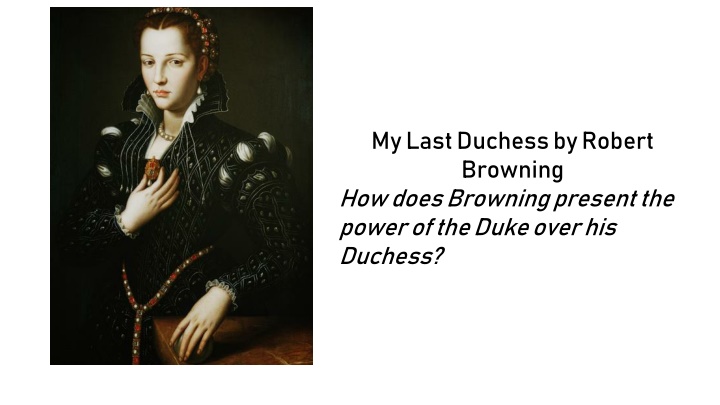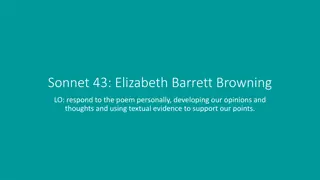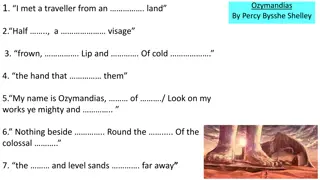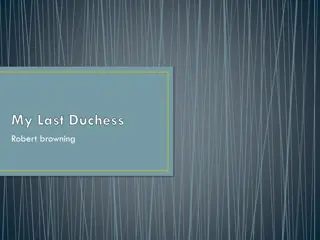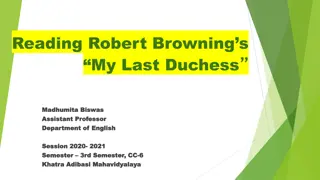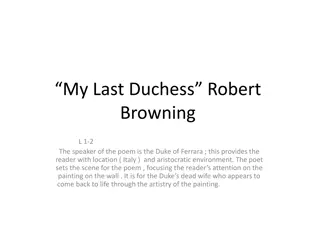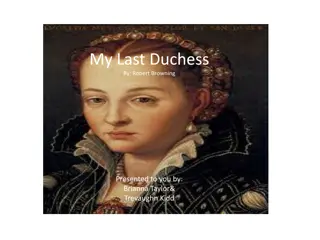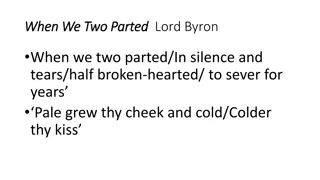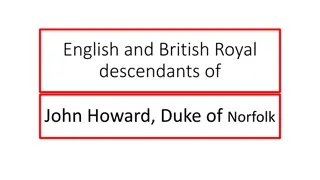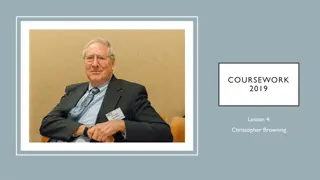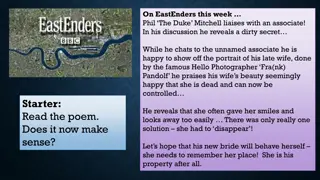Browning's Presentation of the Duke's Power
Browning explores the Duke of Ferrara's dominance over his Duchess in "My Last Duchess." Through objectification, possession, and manipulation, the Duke exerts control over his deceased wife, highlighting his oppressive power dynamics within the marriage.
Download Presentation

Please find below an Image/Link to download the presentation.
The content on the website is provided AS IS for your information and personal use only. It may not be sold, licensed, or shared on other websites without obtaining consent from the author.If you encounter any issues during the download, it is possible that the publisher has removed the file from their server.
You are allowed to download the files provided on this website for personal or commercial use, subject to the condition that they are used lawfully. All files are the property of their respective owners.
The content on the website is provided AS IS for your information and personal use only. It may not be sold, licensed, or shared on other websites without obtaining consent from the author.
E N D
Presentation Transcript
My Last Duchess by Robert Browning How does Browning present the power of the Duke over his Duchess?
Robert Browning and My Last Duchess Browning is an English poet who is famous for writing poems in the dramatic monologue form. He was born in Surrey. His father was a well-paid administrator at the Bank of England and his grandfather was a wealthy slave owner in the West Indies. His father was an avid collector of books who encouraged his children to pursue the arts. His mother was a devout non-conformist. By the age of 12, Browning had written his first collection of poems. He studied Greek at University College, London. He devoted his life to writing poetry, remaining at home with his parents until he was 34, when he married the poet Elizabeth Barrett. Her father disapproved of her marrying anyone, and so the couple moved to Italy where they had a son and lived out the rest of their lives. My Last Duchess is a poem based on real characters from history. The speaker is Duke Alfonso II who ruled northern Italy, Ferrara, from 1559-97. His title was the Duke of Ferrara. His first wife was Lucrezia de Medici. She was fifteen years old when she married him, and she died two years later in 1561. There were suspicions that she had been poisoned. The poem is set in 1564, three years after her death. A negotiator has arrived from the Count of Tyrol to arrange for the Duke to marry his daughter. The Duke married three times during his life time. The artist who painted Lucrezia s picture is also an historical figure, Fra Pandolf, who was a celebrated portrait painter.
The poem is spoken by the character of the Duke of Ferrara. He is showing a man who has arrived to organise his marriage to a new woman, a portrait of his dead first wife. While the Duke describes his first wife, the reader begins to suspect that something dreadful may have happened to her.
How does Browning present the power of the Duke over his Duchess?
1. The Duke objectifies the Duchess. Adjective: alive We learn that she is dead. Noun phrase: My Last Duchess the possessive pronoun MY indicates that he feels she belongs to him. The adjective last suggests that there will be more wives which reveals quite a cavalier attitude towards women. Proper noun: Fra Pandolf He references well- known artists to make it seem as though he only acquires the best. He is boastful. 2 3 4 5 6 That s my last Duchess painted on the wall, Looking as if she were alive. I call That piece a wonder, now: Fra Pandolf s hands Worked busily a day, and there she stands. Will t please you sit and look at her? I said Reported speech / rhetorical question: Will t please you sit and look at her? We are also invited to sit and view and learn more.
2. The Duke keeps her painting behind a curtain. Parenthesis: (since none puts by / The curtain I have drawn for you, but I) The whisper here reveals her painting is behind a curtain which only the Duke opens and closes. Noun phrase: earnest glance Those that have seen the painting remark on her serious expression what has caused her expression to be so serious? 7 8 9 10 11 12 13 Strangers like you that pictured countenance, The depth and passion of its earnest glance, But to myself they turned (since none puts by The curtain I have drawn for you, but I) And seemed as they would ask me, if they durst, How such a glance came there; so, not the first Are you to turn and ask thus. Sir, twas not This again, suggests an element of control in terms of him deciding who does and does not see it. He likes the power over others. Symbolic of their relationship..
3. The Duke finds her positive outlook displeasing. Noun: spot an unnatural mark he doesn t like her being happy. Reported speech: twas not cheek the utterance here reveals that he suggests he wasn t the only one to bring her joy. Only a controlling person would expect their wife to be happy only when they are around.. 14 15 16 17 18 19 20 21 22 23 24 Are you to turn and ask thus. Sir, twas not Her husband s presence only, called that spot Of joy into the Duchess cheek: perhaps Fra Pandolf chanced to say, Her mantle laps Over my lady s wrist too much, or Paint Must never hope to reproduce the faint Half-flush that dies along her throat : such stuff Was courtesy, she thought, and cause enough For calling up that spot of joy. She had A heart how shall I say? too soon made glad, Too easily impressed; she liked whate er Adverbs: too Initially positive qualities (glad, easily impressed) are presented but the inclusion of too makes it seem excessive. He does not like how happy she is with other people or how impressed she is by them. He wants her to only be pleased by him.
4. The Duke feels as though the Duchess does not appreciate him. Listing: The dropping of the bough of the white mule The Duke lists all the things that bring the Duchess joy. All of this things are low in cost. The fact this annoys him means he is more materialistic. 25 26 27 28 29 30 31 32 33 34 35 36 37 38 39 40 41 42 43 44 45 46 She looked on, and her looks went everywhere. Sir, twas all one! My favour at her breast, The dropping of the daylight in the West, The bough of cherries some officious fool Broke in the orchard for her, the white mule She rode with round the terrace all and each Would draw from her alike the approving speech, Or blush, at least. She thanked men, - good! But thanked Somehow I know not how as if she ranked My gift of a nine-hundred-years-old name With anybody s gift. Who d stoop to blame This sort of trifling? Even had you skill In speech (which I have not) to make your will Quite clear to such an one, and say, Just this Or that in you disgusts me; here you miss, Or there exceed the mark and if she let Herself be lessoned so, nor plainly set Her wits to yours, forsooth, and made excuse, - E en then would be some stooping; and I choose Never to stoop. Oh sir, she smiled, no doubt, Whene er I passed her; but who passed without Much the same smile? Adverb / preposition: everywhere He doesn t like that she is looking in all directions and finding joy. Adverb / preposition: all , each He doesn t like that everyone no matter who they are would receive smiles and warm talk from her Repetition: thanked It annoys him that she thanks everyone. The aside I know not how shows he does not understand her pleasant disposition or how she views everyone the same. Line: even then would be some stooping If he were to speak to her, he feels it would be beneath him. Even though he would like her lessoned (verb) to behave in what he deems an appropriate way. Rhyme: thanked, ranked One of few rhymes emphasizes his anger Lines: My gift with anybody s gift He doesn t feel as though she appreciates his name. Her use of his name could also be seen as possessive. He thinks she should appreciate a. belonging to him b. the ancient title. Rhetorical question: Who d stoop to blame /This sort of trifling Here he suggests he is too proud to lower himself and tell her he does not like her attitude. Rhetorical question: but who passed without / Much the same smile Shows his insecurity and jealousy at how she treats everyone warmly and not just him.
5. He starts to give her orders. Verb: grew The longer he knew her, the more smiles her saw. This increased his level of jealousy and insecurity. Active sentence: I gave commands The duke would rather instruct her (commands, noun) than talk with her which reveals his controlling and possessive nature. 46 47 48 Much the same smile? This grew; I gave commands; Then all smiles stopped together. There she stands As if alive. Will t please you rise? We ll meet Sequencing connective: then To introduce the consequence of him giving commands CLause: all smiles stopped together When the Duke commanded the Duchess, she stopped smiling. Sibilance implies a sinister tone. Potential euphemism for her death. Caesura through question: Will t please you rise? Abrupt shift with no mention of her death and the cause of her death. Seems suspicious. Long monologue about her behavior pre-death seems indulgent. Duke is focused on how he feels wrong and shows little compassion for her loss.
6. We are left wondering what will become of the new duchess. Noun phrase: my object referring to the Count s daughter he already sees her as a possession. Noun: dowry A dowry is a payment from a father to a new husband for taking his daughter of his hands trade of goods. 48 49 50 51 52 53 54 55 56 57 As if alive. Will t please you rise? We ll meet The company below, then. I repeat, The Count your master s known munificence Is ample warrant that no just pretence Of mine for dowry will be disallowed; Though his fair daughter s self, as I avowed At starting, is my object. Nay, we ll go Together down, sir. Notice Neptune, though, Taming a sea-horse, thought a rarity, Which Clause of Innsbruck cast in bronze for me! Pronoun and exclamation mark: for me! Selfish and egotistical as though everything is about him Proper noun: Clause of Innsbruck once again he is being boastful. He is the owner of beautiful things made by famous people Allusion: Neptune, though, / Taming a sea-horse Another beautiful sculpture but symbolic of the relationship between the Duke and the Duchess. The verb taming shows an element of control with regard to expected behavior.
My Last Duchess by Robert Browning How does Browning present the power of the Duke over his Duchess?
